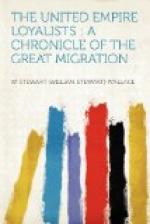It was not surprising, under these circumstances, that Governor Parr and the officers of his government should have become very unpopular on the north side of the Bay of Fundy. Governor Parr was himself much distressed over the ill-feeling against him among the Loyalists; and it should be explained that his failure to satisfy them did not arise from unwillingness to do anything in his power to make them comfortable. The trouble was that his executive ability had not been sufficient to cope with the serious problems confronting him. Out of the feeling against Governor Parr arose an agitation to have the country north of the Bay of Fundy removed from his jurisdiction altogether, and erected into a separate government. This idea of the division of the province had been suggested by Edward Winslow as early as July 1783: ’Think what multitudes have and will come here, and then judge whether it must not from the nature of things immediately become a separate government.’ There were good reasons why such a change should be made. The distance of Parrtown from Halifax made it very difficult and tedious to transact business with the government.’ and the Halifax authorities, being old inhabitants, were not in complete sympathy with the new settlers. The erection of a new province, moreover, would provide offices for many of the Loyalists who were pressing their claims for place on the government at home. The settlers, therefore, brought their influence to bear on the Imperial authorities, through their friends in London; and in the summer of 1784 they succeeded in effecting the division they desired, in spite of the opposition of Governor Parr and the official class at Halifax. Governor Parr, indeed, had a narrow escape from being recalled.
The new province, which it was intended at first to call New Ireland, but which was eventually called New Brunswick, was to include all that part of Nova Scotia north of a line running across the isthmus from the mouth of the Missiquash river to its source, and thence across to the nearest part of Baie Verte. This boundary was another triumph for the Loyalists, as it placed in New Brunswick Fort Cumberland and the greater part of Cumberland county. The government of the province was offered first to General Fox, who had been in command at Halifax in 1783, and then to General Musgrave; but was declined by both. It was eventually accepted by Colonel Thomas Carleton, a brother of Sir Guy Carleton, by whom it was held for over thirty years. The chief offices of government fell to Loyalists who were in London. The secretary of the province was the Rev. Jonathan Odell, a witty New Jersey divine, who had been secretary to Sir Guy Carleton in New York. It is interesting to note that Odell’s son, the Hon. W. F. Odell, was secretary of the province after him, and that between them they held the office for two-thirds of a century. The chief justice was a former judge of the Supreme Court of New York; the other judges were retired officers of regiments who had fought in the war. The attorney-general was Jonathan Bliss, of Massachusetts; and the solicitor-general was Ward Chipman, the friend and correspondent of Edward Winslow. Winslow himself, whose charming letters throw such a flood of light on the settlement of Nova Scotia and New Brunswick, was a member of the council. New Brunswick was indeed par excellence the Loyalist province.




